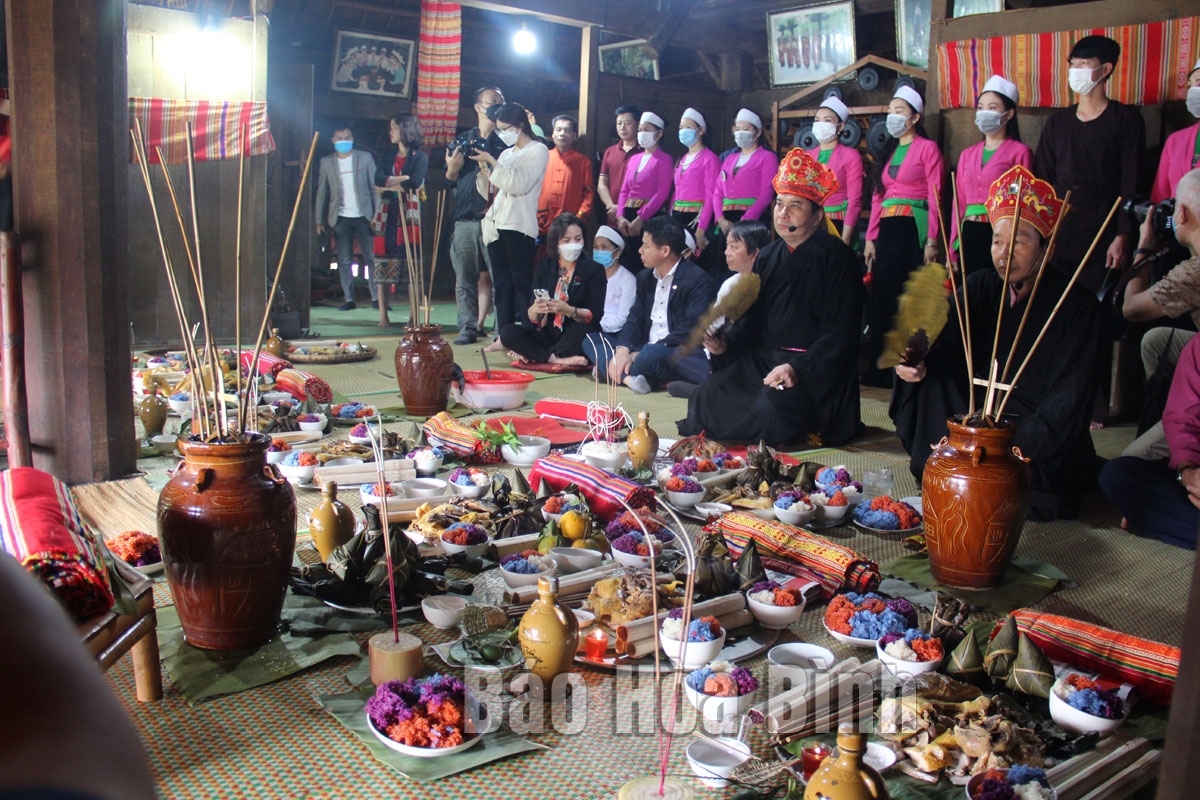
(HBO) – The house-cooling ritual of Muong ethnic people in Hoa Binh province was re-enacted at the Vietnamese Ethnic Culture Village in Dong Mo Commune, Son Tay Town, Hanoi on November 21 in response to the 2021 "Great unity of nations - Vietnamese Cultural Heritage" Week.
The
shaman invites the tutelary God of the village to attend the house cooling
ceremony.
The house-cooling ritual is one of the traditional rituals of the Muong people
which aims to pray for favourable weather conditions, bumper crops and good
health for everyone. After preparing the offerings, the shaman invites Thanh
Hoang (Tutelary God ) and other saints to attend the house-cooling ceremony to
bless.
The house cooling ceremony is one of the traditional rituals of the Muong
people, in order to pray for favourable rain, good wind, good crops, and good
health for everyone. In the space of the Muong house, after preparing the
offerings of offerings, the magician reads vows to invite the Holy Scriptures,
Thanh Hoang and his superiors to attend the house-warming ceremony to pray for
health, luck and a good crop.
The shaman made a ceremony to sprinkle water to cool the offerings and tell the
story of the Muong people. He offered offerings and wine to the ancestors and
said goodbye to the holy saints. Then, the shaman would sprinkle water, chant
mantras to cool the furniture in the house.
At the end of the ritual, the shaman would ask for
names, then cast a spell and tied a red thread around the wrists of
participants. This was a form of praying for luck, health, and harmonious life.
After the ritual part ends, the Muong people invite the shaman, ethnic minority
groups living in the village and tourists to drink wine together. By doing so,
they finished a meaningful and equally solemn rendition of the Muong ethnic
identity.
The "Great Unity of Ethnic Groups - Vietnam's Cultural Heritage" week
in 2021 will take place from November 18 to 23, with many interesting and
meaningful programs and events, contributing to promoting the cultural identity
of the community of 54 ethnic groups in implementing the movement "All
people unite to build a cultural life", protect and promote the values of
community cultural heritage and build an advanced Vietnamese culture imbued
ethnic identities./.
With an increasingly vibrant and widespread emulation movement aimed at building cultured residential areas and cultured families, Yen Thuy District has been making steady progress toward improving both the material and spiritual well-being of its people, while fostering a civilized, prosperous, beautiful, and progressive community.
Once lacking recreational spaces and community facilities, Residential Group 2 in Quynh Lam Ward (Hoa Binh City) has recently received attention for the construction of a new, spacious, and fully equipped cultural house. The project followed the model of state support combined with public contributions in both labor and funding.
The "All people unite to build cultural life" movement, which has been effectively integrated with Kim Boi district’s socio-economic development goals, is fostering a lively spirit of emulation across local residential areas, hamlets, villages, public agencies, and enterprises. In addition, through the initiative, traditional cultural values are being preserved and promoted, while community solidarity and mutual support in poverty reduction and economic development are being strengthened.
A working delegation of the Hoa Binh provincial People’s Committee led by its Permanent Vice Chairman Nguyen Van Toan on June 11 inspected the progress of a project to build the Mo Muong Cultural Heritage Conservation Space linked to tourism services in Hop Phong commune, Cao Phong district.
Born and growing in the heroic land of Muong Dong, Dinh Thi Kieu Dung, a resident in Bo town of Kim Boi district, in her childhood was nurtured by the sweet lullabies of her grandmother and mother. These melodies deeply imprinted on her soul, becoming an inseparable part of her love for her ethnic group's culture. For over 20 years, this love for her hometown has driven Dung to research, collect, and pass down the cultural values of the Muong people to future generations.
In the final days of May, the Ethnic Art Troupe of Hoa Binh Province organized performances to serve the people in remote, mountainous, and particularly disadvantaged areas within the province. These were not just ordinary artistic shows, but they were the meaningful journeys aimed at spreading cultural values, enhancing the spiritual life of the people and contributing to the preservation of ethnic minority cultural identities.



